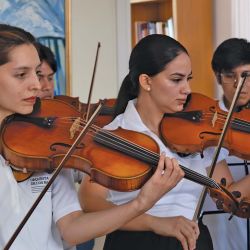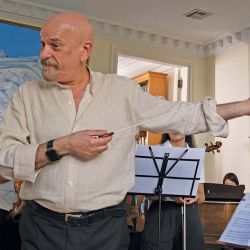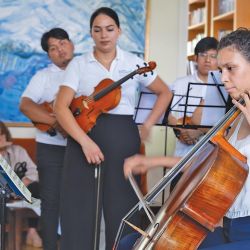When Ruth Geréz picked up her first violin at age seven, she was eager to practise, but terrified of solos.
“I was scared of playing alone, that others would listen to me, look at me and judge,” Geréz, 26, confesses quietly. On stage, she always imagined herself staying hidden within the ensemble.
But on a recent summer afternoon, nearly two decades later, accompanied by fellow members of the Orquesta de los Barrios youth orchestra, she beamed while performing Astor Piazzolla’s ‘Primavera Porteña’ as a featured soloist, front and centre.
Rather than frightening her, Geréz says crowds of spectators now motivate her to continue studying and sharing the music she loves most. Since joining at the inception of the programme in 2018, the orchestra has helped her build self-confidence and feel more comfortable connecting with new people, she said.
Members of the orchestra have performed for international ambassadors and in the halls of Teatro Colón. In many ways, the programme acts as a gateway into the professional music world. Cellist Michelle Olivera has gone on to study at a music academy in Germany, and violinist Diego Alegre has spent a year delighting guests aboard a cruise ship travelling the Caribbean.
While the young musician’s aspirations stretch worldwide, they each got their start in similar places: the city’s low-income villas, or low-income neighbourhoods. The majority live in Retiro’s Villa 31; others come from Bajo Flores, La Boca, Villa Lugano, Balvanera, Cildanez, Soldati and Mataderos.
The Orquesta de los Barrios — which features musicians ranging from age 15 to 27 — is dedicated to providing music access, education and professional development to adolescents who can’t find it elsewhere.
Director Néstor Tedesco recruits members from other local orchestras he leads, with eyes on their enthusiasm, musical talent and level of economic need.
A group of six women, lovingly referred to as “las amigas,” fundraise year-round to support the musicians with monthly stipends and compensation for each performance. They provide the teenagers with donated instruments, since many of them lose access to their school-provided instruments upon graduating from secondary school.
Geréz, who grew up in Villa Lugano, says it’s not just the music and the opportunities – the community around the orchestra has changed the trajectory of her life.
“To be in a group of people – un grupo humano, that is made up of young people who all come from humble neighbourhoods that don’t have a lot of possibility or opportunities, and thanks to all of this that we do and that las amigas help with, we are able to continue forward and be motivated,” she says with a smile.
Friendly support
Las amigas, some of whom are members of the University Women’s Club of Buenos Aires, approached Tedesco in 2018 with hopes of supporting his musicians in any way they could. The Orquesta de los Barrios became the synthesis of this collaboration.
The group of women collect community donations, reserve music venues, offer free English lessons and teach public speaking classes to students. A group reunion never goes without an accompanying meal.
“This is a group of young people who have grown together and it wouldn’t exist in this form if it weren’t for this group of amigas de la orquesta. They achieve and search for all kinds of benefits for the group,” Tedesco said. “It is shaped by personal experiences.”
A nephew of one of the volunteers was no longer using his clarinet, so he donated it to one of the young men in the orchestra this year.
“They have been linked through that donation,” Tedesco said. “Imagine such an experience for a humble young man, to receive a prize that allows him to continue his education.”
Las amigas help maintain a collection of recycled strings for replacements, since buying them new in Argentina can cost hundreds.
These volunteers never cease to be impressed by the dedication and musical ability of the young people they support.
“They’re really determined to take every single opportunity open to them, to carve their own future,” volunteer Phyllis Barrantes told the Times.
In addition to routine group rehearsals, each musician follows an individual study programme. Even the Covid-19 pandemic couldn’t stop the project – the musicians met frequently online to practice and perform over Zoom.
Tedesco remains inspired by the young people’s dedication to growing, not just musically, but in every area of life.
“The other day, someone said he was interested in donating books he had in his house because he was going to move. And I told the kids about it. They all went to get books, and each one took about 10 books,” Tedesco recalled.
“It's a very, very warm group of young kids who are enthusiastic about moving forward in life.”
Meaning and music
To violinist Geréz, classical music is a force of connection — it runs through the soul, one’s emotions and the natural world, she says. It also brings people together.
Tedesco has witnessed how owning an instrument can give young people something tangible to rely on, what he calls a "tabla de salvación."
Geréz, who also works as a car mechanic, says her violin has carried her through the most difficult times of her life, including the death of her mother.
“It was what saved me. I don’t know where I would have been today,” she said.
Many in the team are dedicated to becoming full-time professional musicians. Others are pursuing separate careers, but say music will always be a major part of their lives.
Seventeen-year-old Alexis Apaza, who grew up in Villa 31, is currently studying engineering and computer science at university.
“[The orchestra] is the synthesis of what it means to help a young person by opening up the horizon to many places,” Tedesco said. “I discovered that young people, when they have enthusiasm and they have a good heart, no matter where they come from, they want to do things, and if you help them, they'll do them better.”
Parents and friends come to watch their shows, which creates a tight-knit community of support. Amidst Argentina’s constant changes to government funding, Tedesco said public music programmes sustain themselves through community collaboration.
Since joining the orchestra a year ago, best friends and violinists Paloma Barreiro, 21, and Ambar Velasco, 18, return to Villa Lugano together after each rehearsal.
They describe the music as giving them a purpose.
“Being in the orchestra, being together, generates a lot of discipline, this is a constant. You get used to having a routine from a very young age, being organised, and also being a good companion,” Velasco said.
When Geréz finished her solo on that recent summer afternoon, the room burst into applause. Las amigas served appetisers and desserts after the show, and the musicians mingled with smiles on their faces.
“I can’t imagine doing anything else,” Velasco added.
* You can find information about upcoming performances and learn about ways in which you can support the orchestra via its Instagram page: @orquestadelosbarrios.





























Comments